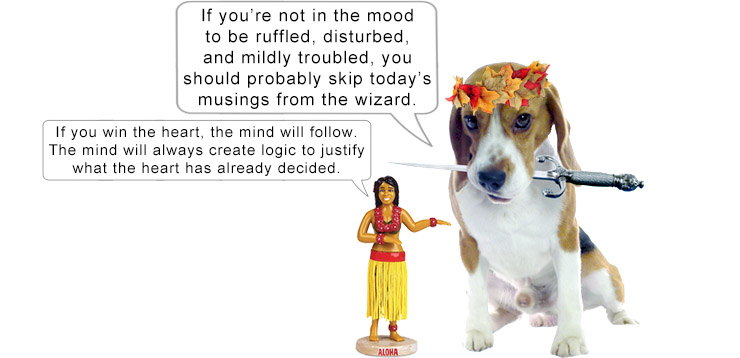“Hoare writes with the license of the nonexpert; you can feel the delight he takes in being unbound by anything but his enthusiasms.”
John Williams was describing Philip Hoare when he wrote that line, but he could easily have been describing me. As a nonexpert, I am free to speculate and arrive at my own conclusions.
So are you.
And so is your customer.
You, me, and your customer claim we use deductive reasoning, but it simply isn’t true. Deductive reasoning – the basis of scientific method – would require us to work diligently to disprove what we believe.
Do you know anyone who actually does that?
Rather than use deductive reasoning, we use inductive reasoning to search out information confirming that our values, beliefs, instincts, and preferences have been right all along.
When confronted with contradictory information, our confirmation bias kicks in to assure us the contradictory information is not correct, so we dismiss it with the flick of a mental finger.
Let me help you with that flicking away of contradictory information. I am an ad writer. Magical thinking, inductive reasoning, and confirmation bias sparkle at my fingertips.
My job is to speak to that which is already within you. You have more than enough information. Let me agree with what you already believe.
Google and Facebook will use their algorithms to help us build a community where we can surround ourselves with like-minded people who share our opinions and beliefs. Everyone who doesn’t agree with us is uninformed, misinformed, fooled by faulty data, foolish rumor, or evil geniuses.
Magical thinking, inductive reasoning, and confirmation bias sparkle at the fingertips of every evil genius. But I am not an evil genius. I am the genius that agrees with you.
Magical thinking is difficult to explain, but Kurt Andersen does a pretty good job:
“Americans have always been magical thinkers and passionate believers in the untrue. Our nation was started by Puritans in New England who wanted to create a Christian utopia as they waited for the imminent second coming of Christ and the End of Days. To the south, a bunch of people were convinced, absolutely convinced, that this place they had never been was full of gold waiting to be plucked from the dirt in Virginia. They stayed there looking and hoping for gold for 20 years before they finally faced the facts and decided they weren’t going to get rich overnight.”
“This was the beginning of America. Next we had centuries of ‘buyer beware’ charlatanism and medical quackery to an extreme degree, along with increasingly exotic, extravagant, implausible cults and religions.”
“All those things came together and were supercharged in the 1960s, when you were entitled to your own truth and your own reality. A generation later the internet came along, giving each of those realities, no matter how false or magical or nutty they are, their own kind of media infrastructure.”
A wonderful story is dazzling and attractive, regardless of whether or not it is true. This is the basis of all successful advertising.
“Hoare writes with the license of the nonexpert; you can feel the delight he takes in being unbound by anything but his enthusiasms.”
John Williams wrote those words in his recommendation of Philip Hoare’s new book, “Albert and the Whale: Albrecht Dürer and How Art Imagines Our World.”
John Williams book review column is titled, appropriately, “Books of the Times.”
Roy H. Williams
NOTE: Big, BIG rabbit hole today. – Indy Beagle
“A wise man changes his mind sometimes, but a fool never. To change your mind is the best evidence you have one.” – Desmond Ford
 If Clay Stafford were to put all of his titles on a single business card, that card would be the size of a movie poster. Clay is a poet, a screenwriter, a playwright, a film and television producer, a director, showrunner, actor, educator, reviewer, and top-tier public speaker. His books have sold nearly four million copies. He is also founder of The Killer Nashville International Writers’ Conference – now in its 16th year – the premier forum for mysteries, thrillers, and suspense. What can you and I learn from Clay Stafford’s highly successful approach to artistry? Friend, we’re about to find out! Welcome to MondayMorningRadio.com.
If Clay Stafford were to put all of his titles on a single business card, that card would be the size of a movie poster. Clay is a poet, a screenwriter, a playwright, a film and television producer, a director, showrunner, actor, educator, reviewer, and top-tier public speaker. His books have sold nearly four million copies. He is also founder of The Killer Nashville International Writers’ Conference – now in its 16th year – the premier forum for mysteries, thrillers, and suspense. What can you and I learn from Clay Stafford’s highly successful approach to artistry? Friend, we’re about to find out! Welcome to MondayMorningRadio.com.
